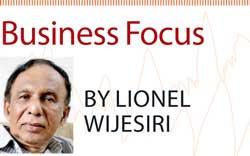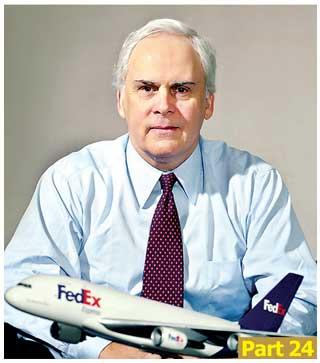Reply To:
Name - Reply Comment
Last Updated : 2024-04-18 03:16:00
 Frederick Wallace “Fred” Smith (born August 11, 1944) is the founder, Chairman and CEO of FedEx, originally known as Federal Express. The company is headquartered in Memphis, Tennessee.
Frederick Wallace “Fred” Smith (born August 11, 1944) is the founder, Chairman and CEO of FedEx, originally known as Federal Express. The company is headquartered in Memphis, Tennessee.
The Smiths were a well-to-do family but Fred’s father died when he was only four and the growing boy had to rely on his mother and uncles for guidance. Smith was crippled by bone disease as a small boy but regained his health by age 10, before becoming an excellent football player and learning to fly at age 15. He became an amateur pilot as a teenager.

In 1962, Smith entered Yale University and while there, he wrote a concept paper for an economics class, outlining overnight delivery service in a computer information age. His professor found the premise improbable and gave him a C grade for this effort.
After graduation, Smith enlisted in the Marine Corps and served two tours of duty in Vietnam, flying over 200 combat missions. While in the military, he carefully studied the procurement and delivery procedures, fine-tuning his dream for an overnight delivery service.
Smith got his chance when he left the service. In 1971, Smith founded Federal Express with his US $ 4 million inheritance and US $ 91 million in venture capital.
The delivery service began modestly with small packages and documents. On the first night of operations, a fleet of 14 jets took off with 186 packages. In the first two years, the venture lost US $ 27 million. By third year, the company was on the verge of bankruptcy but Smith succeeded in renegotiating his bank loans and was able to keep the company afloat.
He then held some high-profile promotion campaigns targeted not only business owners but also executives and secretaries with responsibility for urgent deliveries. His slogan was, ‘When it absolutely, positively has to be there overnight.’ The company gradually began to turn a profit.
Unlike many entrepreneurs, Smith is also a hands-on manager, who directs every facet of corporate strategy. He determined at the outset that FedEx was in the information business - that knowledge about origin, present whereabouts, destination, estimated time of arrival, price and shipment cost of his cargo was as important as its prompt delivery.
Another principle Smith applied at FedEx was to make sure every employee felt they could share in the success of the company. FedEx managers are carefully trained to ensure respect for all employees and their performance is monitored. Managers are evaluated annually by both bosses and workers to ensure good relations between all levels of the company. Smith believes that company loyalty always pays off.
Smith’s professor at Yale may not have seen the need for overnight delivery but today’s business world depends on businesses like FedEx shipping all manner of goods around the globe quickly and reliably. Smith’s fleet of MD11s and A300s circle the globe carrying all manner of goods: Maine lobsters, Japanese cherries, Hawaiian flowers, medicines, heart monitors, contact lenses, surgical scalpels, tennis shoes, circuit boards, fresh blood, tractor parts, auto bumpers, European fragrances, Swiss watch parts.
In 1997, Smith acquired the US $ 2.7 billion Caliber System, whose trucking subsidiary RPS ranked second in ground shipments, exceeded only by the United Parcel Service. The RPS fleet of 13,500 trucks increased FedEx’s profit margin because ground fleets are cheaper to operate than airplanes. It also gave FedEx the extra muscle it needed to step into the breach when FedEx competitor UPS was immobilized by a strike later
that year.
Fred Smith’s effort to instil company loyalty bore fruit. During the UPS strike, when FedEx was swamped with 800,000 extra packages a day, thousands of employees, many of whom had already worked a full day, voluntarily poured into the hubs a little before midnight to sort the mountain of extra packages. Smith publicly thanked them in 11 full-page newspaper ads and he also ordered special bonuses.
When the strike was over and the smoke cleared, FedEx had pulled roughly two percentage points of market share away from UPS, increasing its share of the express transportation market to more than 43 percent. The stock market responded to FedEx’s gains. Over the course of the year, the company’s share price rose by nearly 70 percent. While UPS has faced additional labour unrest among its pilots, FedEx pilots are among the best-compensated and most contented in the industry.
Fred Smith has never allowed FedEx to rest on its laurels. Continuous improvement is one of his fundamental management principles. In the 1990s, the company installed computer terminals in the offices of over 100,000 customers and gave proprietary software to more than half a million more, enabling shippers to label their own packages. Today, most FedEx customers print their own labels directly from the FedEx website. FedEx receives electronic notification to pick up the cargo, then ships and delivers. Competitors in the express delivery business are still rushing to catch up with FedEx’s technological advances.
In 2001, FedEx made an unprecedented deal with the United States Post Office, contracting to transport large mail shipments for the Post Office, while installing FedEx drop boxes in U.S. Post Offices. Three years later, FedEx also took on international express shipments for the Post Office. That same year, 2004, FedEx purchased the document services company Kinko’s, eventually renaming the business FedEx Office.
At over 1,800 locations across the United States, customers can print, copy and bind their documents and dispatch them for overnight shipping from one convenient location. In April 2015, FedEx acquired their rival firm TNT Express as the company expanded its operations throughout Europe.
Today, FedEx Corporation is the world’s leading express transportation provider. More than 400,000 FedEx team members worldwide field a fleet of 656 aircraft and more than 150,000 other motorized vehicles, delivering over 12 million packages every business day, to more than 220 countries
and territories.
Businesses seeking to reduce the costs of maintaining large inventory are increasingly adopting “just in time” delivery practices, increasing the demand for express services like FedEx. The rise of Internet commerce and the growth of the global economy also contributed to the company’s growth. FedEx capitalized on both of these trends, with proprietary software for Internet catalogue service and the completion of facilities in the Philippines, Taiwan, France and China. Around the globe, communications and transport continue to develop along the lines Fred Smith predicted in his term paper half a century ago,
What lessons can we learn from Fred Smith?
Make reputational intelligence a priority: Your reputation is different from your brand. Smith notes that FedEx sells trust (e.g. the promise that medical equipment will make it to important destinations) and not just package delivery. You need to know what your brand is really about and emphasize it.
Create a culture that is always striving for excellence: FedEx employees have the Purple Promise in which they declare, “I will make every FedEx experience outstanding.”
Don’t hide your failures but use them to improve: When a video went viral of a deliveryman throwing a computer screen over a fence, Smith didn’t try to hide it. Instead, he talked about it openly and used it as a platform for learning and improving.
Always look to improve your processes: FedEx has never sacrificed service (even if it would be almost unnoticeable to customers) in order to add to its bottom line.
Take advantage of unexpected areas for growth: Did you know that FedEx repairs electronics like iPads and Nooks? The delivery company has the systems in place to transport items to a central repair shop and the technology to fix products. While not the core of its business, it’s still a US $ 15 billion market.
(Lionel Wijesiri is a retired company director with over 30 years’ experience in senior business management. Presently he is a freelance journalist and could be contacted on lawije@gmail.com)

Add comment
Comments will be edited (grammar, spelling and slang) and authorized at the discretion of Daily Mirror online. The website also has the right not to publish selected comments.
Reply To:
Name - Reply Comment
On March 26, a couple arriving from Thailand was arrested with 88 live animal
According to villagers from Naula-Moragolla out of 105 families 80 can afford
Is the situation in Sri Lanka so grim that locals harbour hope that they coul
A recent post on social media revealed that three purple-faced langurs near t

10 Apr 2024
09 Apr 2024